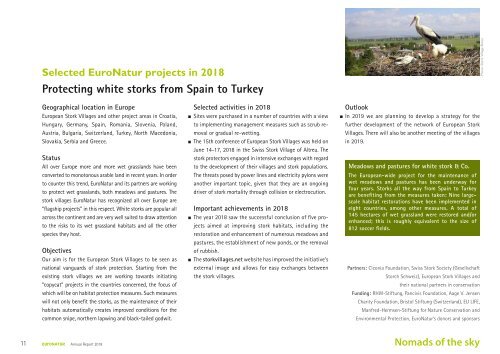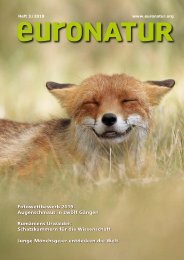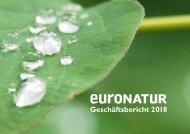Annual Report 2018 EuroNatur Foundation
Here you can get a good overview about our conservation programmes in Europe. Conatains also financial information.
Here you can get a good overview about our conservation programmes in Europe. Conatains also financial information.
Create successful ePaper yourself
Turn your PDF publications into a flip-book with our unique Google optimized e-Paper software.
Selected <strong>EuroNatur</strong> projects in <strong>2018</strong><br />
Protecting white storks from Spain to Turkey<br />
Photo: Stork Village Bizica<br />
Geographical location in Europe<br />
European Stork Villages and other project areas in Croatia,<br />
Hungary, Germany, Spain, Romania, Slovenia, Poland,<br />
Austria, Bulgaria, Switzerland, Turkey, North Macedonia,<br />
Slovakia, Serbia and Greece.<br />
Status<br />
All over Europe more and more wet grasslands have been<br />
converted to monotonous arable land in recent years. In order<br />
to counter this trend, <strong>EuroNatur</strong> and its partners are working<br />
to protect wet grasslands, both meadows and pastures. The<br />
stork villages <strong>EuroNatur</strong> has recognized all over Europe are<br />
“flagship projects” in this respect. White storks are popular all<br />
across the continent and are very well suited to draw attention<br />
to the risks to its wet grassland habitats and all the other<br />
species they host.<br />
Objectives<br />
Our aim is for the European Stork Villages to be seen as<br />
national vanguards of stork protection. Starting from the<br />
existing stork villages we are working towards initiating<br />
“copycat” projects in the countries concerned, the focus of<br />
which will be on habitat protection measures. Such measures<br />
will not only benefit the storks, as the maintenance of their<br />
habitats automatically creates improved conditions for the<br />
common snipe, northern lapwing and black-tailed godwit.<br />
Selected activities in <strong>2018</strong><br />
Sites were purchased in a number of countries with a view<br />
to implementing management measures such as scrub removal<br />
or gradual re-wetting.<br />
The 15th conference of European Stork Villages was held on<br />
June 14-17, <strong>2018</strong> in the Swiss Stork Village of Altreu. The<br />
stork protectors engaged in intensive exchanges with regard<br />
to the development of their villages and stork populations.<br />
The threats posed by power lines and electricity pylons were<br />
another important topic, given that they are an ongoing<br />
driver of stork mortality through collision or electrocution.<br />
Important achievements in <strong>2018</strong><br />
The year <strong>2018</strong> saw the successful conclusion of five projects<br />
aimed at improving stork habitats, including the<br />
restoration and enhancement of numerous meadows and<br />
pastures, the establishment of new ponds, or the removal<br />
of rubbish.<br />
The storkvillages.net website has improved the initiative’s<br />
external image and allows for easy exchanges between<br />
the stork villages.<br />
Outlook<br />
In 2019 we are planning to develop a strategy for the<br />
further development of the network of European Stork<br />
Villages. There will also be another meeting of the villages<br />
in 2019.<br />
Meadows and pastures for white stork & Co.<br />
The European-wide project for the maintenance of<br />
wet meadows and pastures has been underway for<br />
four years. Storks all the way from Spain to Turkey<br />
are benefiting from the measures taken: Nine largescale<br />
habitat restorations have been implemented in<br />
eight countries, among other measures. A total of<br />
145 hectares of wet grassland were restored and/or<br />
enhanced; this is roughly equivalent to the size of<br />
812 soccer fields.<br />
Partners: Ciconia <strong>Foundation</strong>, Swiss Stork Society (Gesellschaft<br />
Storch Schweiz), European Stork Villages and<br />
their national partners in conservation<br />
Funding: RHW-Stiftung, Pancivis <strong>Foundation</strong>, Aage V. Jensen<br />
Charity <strong>Foundation</strong>, Bristol Stiftung (Switzerland), EU LIFE,<br />
Manfred-Hermsen-Stiftung for Nature Conservation and<br />
Environmental Protection, <strong>EuroNatur</strong>’s donors and sponsors<br />
11<br />
<strong>Annual</strong> <strong>Report</strong> <strong>2018</strong><br />
Nomads of the sky





